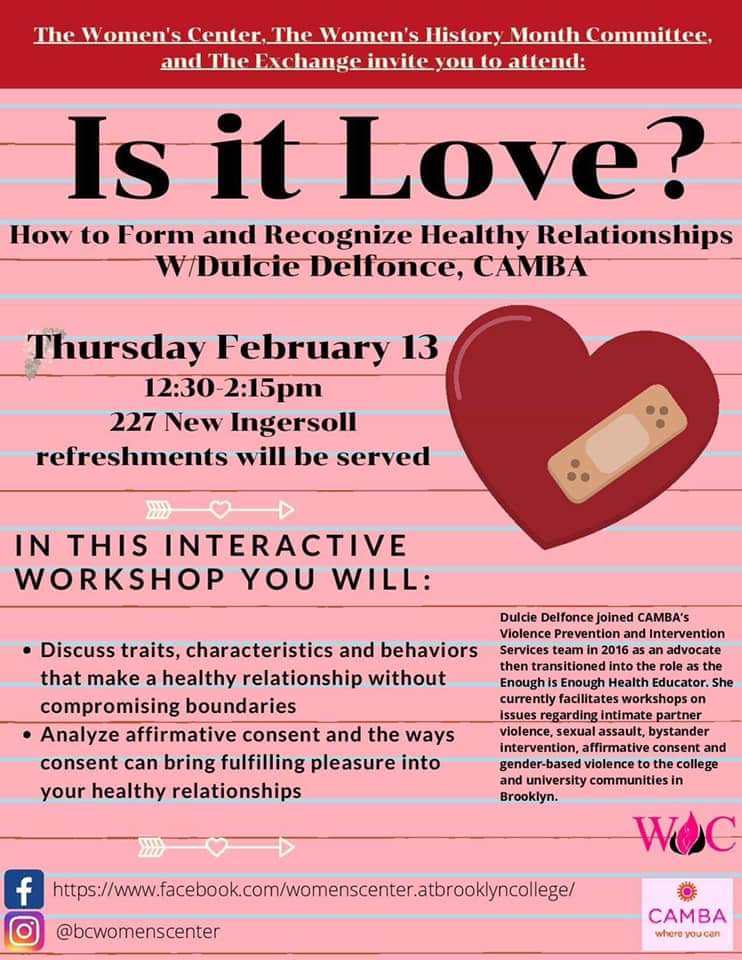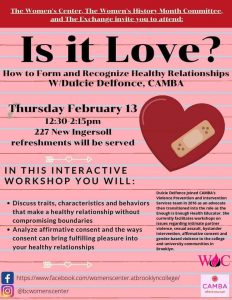
Written By Stacy Fisch
 February is back, and we all know what that means: it is, or rather was, Valentine’s Day! In honor of the special love day among sweethearts, on Thursday, Feb. 13, the Women’s Center and non-profit service agency, CAMBA, a non-profit that provides social services, held a workshop for BC students to recognize the traits and characteristics of a healthy relationship.
February is back, and we all know what that means: it is, or rather was, Valentine’s Day! In honor of the special love day among sweethearts, on Thursday, Feb. 13, the Women’s Center and non-profit service agency, CAMBA, a non-profit that provides social services, held a workshop for BC students to recognize the traits and characteristics of a healthy relationship.
CAMBA members Dulcie Delfonce, and assistant Lizzy Lerner assisted in the workshop to acquaint students with what to search for in a relationship and what to avoid, such as early signs of abuse.
Inspired by interactive games, Heads’ Up and Taboo, Delfonce and Lerner played a team-based game with BC students. Relationship adjectives – words ranging from “fun” to “jealousy” – were written on small white index cards and placed on top of a student’s head. Each student took charge of conveying a given word in their own way, as well as discovering if it belongs in a relationship.
“We might not realize toxic behavior,” says Delfonce. The motive of the game was to help students explore the qualities in a relationship with real-life examples without feeling uncomfortable.
Delfonce and Lerner brought their experience from a program called “Enough is Enough,” which is one of the several programs available at CAMBA. “Enough is Enough” (aka Article 129B) is a law that Governor Cuomo passed which launched a statewide campaign that, according to Delfonce, “encompasses sexual assault on college campuses and the aspect of a uniform definition of consent on college campuses to ensure that people are safe.”
Students around New York State campuses sometimes share stories of what they experienced with abuse. Jessica Perez, a BC student and mother of one, was a victim of domestic violence for almost 20 years. She shared that she felt like a bottle overflowing with water ready to burst.”I’ve had enough,” Perez said as she reflected on what “Enough is Enough” meant for her.
Delfonce and Lerner explained the seven types of abuse and how they weren’t exclusively physical, but could also be neglect or even financial. Unfortunately, some forms are so invisible, victims are unaware they are in an unhealthy relationship. The point of this campaign is to provide awareness and to inform people of all genders who are either in a relationship or want to be in one about the early signs of domestic violence.
The Women’s Center, which hosted the event, offers different services for testing and protection for safe sex. For Women’s History Month, the Women’s Center will be holding an event in the Student Center on March 10 called “Drop The Mic” featuring Kai Davis, performer and poet.
If you or a loved one is in a toxic relationship and/or is a victim of sexual and domestic violence, there are resources. You can call the New York Domestic and Sexual Abuse hotline at 1-800-942-6906. (or, if you’re deaf or hard of hearing, at 1-800-621-HOPE (4673)). If you want to speak to someone in person, visit the on-campus Women’s Center in 227 Ingersoll Extension, and they will assist you in any way that benefits you. If you are scared to speak to someone about it verbally, visit CAMBA’s main website at https://CAMBA.org for more information.
